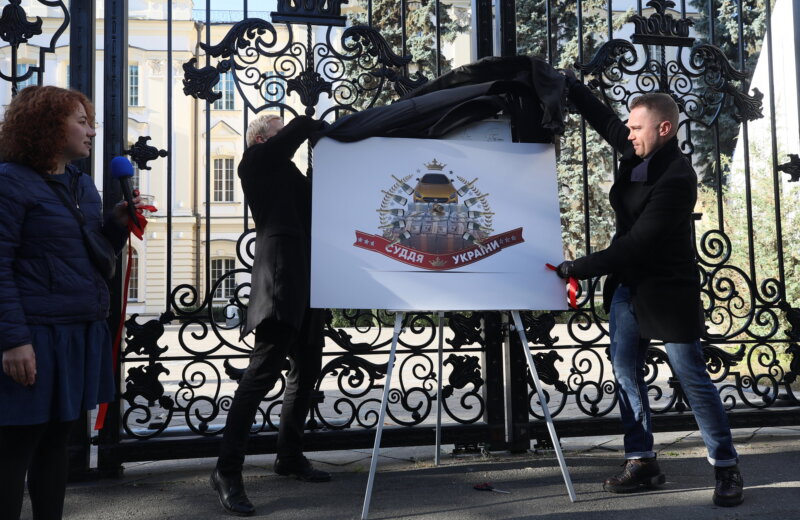The Supreme Court on Oct. 8 paved the way for canceling Ukraine’s judicial reform.
The Supreme Court asked the discredited Constitutional Court to consider the constitutionality of President Volodymyr Zelensky’s judicial reform law. The Constitutional Court has previously destroyed key pillars of Ukraine’s anti-corruption infrastructure and law enforcement reforms.
“They are de facto paving the way for destroying the judicial reform through the Constitutional Court, which has already (destroyed) the laws on asset declarations, illicit enrichment and unlawful court rulings,” Mykhailo Zhernakov, head of legal think tank DEJURE, said on Facebook.
The Supreme Court did not respond to requests for comment.
The judicial reform law, which was passed in July, envisages creating an Ethics Council to oversee the integrity of the judiciary’s main governing body, the discredited High Council of Justice.
The Ethics Council would hire and fire High Council of Justice members. It must contain three Ukrainian judges and three international experts. If a vote is split 3-to-3, international experts’ opinions must prevail.
International organizations have already nominated their experts for the Ethics Council but the Council of Judges, a Ukrainian association of judges, failed to delegate its members in spite of Zelensky’s vow to ensure reform. So far, the president has done little to resolve this stalemate.
The High Council of Justice is the final authority for appointing, firing and punishing judges. The council has been involved in numerous corruption scandals and is known for appointing judges linked to illegal schemes.
Danishevska’s conflict of interest
Anti-corruption activists interpreted the Supreme Court decision as a result of what they say is an illegal favor that Supreme Court head Valentyna Danishevska expects to get from the tainted High Council of Justice. Danishevska and the council did not respond to requests for comment.
Danishevska, who voted for the Supreme Court decision, submitted her resignation on the same day. The High Council of Justice, which is supposed to be cleansed under the judicial reform, is expected to approve paying her a Hr 850,000 one-time payment and a Hr 150,000 retirement pension per month.
Anti-corruption activists see this as a de facto bribe.
“The head of the Supreme Court is saving the discredited High Council of Justice for the sake of getting a big retirement pension,” Vitaly Shabinin, head of the Anti-Corruption Action Center’s executive board, wrote on Facebook. “‘Danishevska doesn’t give a damn about the Venice Commission’s (support for judicial reform) when she can get 150,000 per month for the rest of her life.”
Shabunin and Zhernakov argued that Danishevska is not legally entitled to retirement and a pension because she has not yet served the necessary 20 years as a judge. However, the unreformed High Council of Justice will likely overlook this in return for the destruction of judicial reform, they argue.
“There are several influential groups of judges in the Supreme Court who actually run the whole system,” Halyna Chyzhyk, a judicial expert at the Anti-Corruption Action Center, said. “For years they have been appointing their people to the High Council of Justice and in such a way they controlled the system. For them the creation of the Ethics Council means loss of control over the appointment of members of the High Council of Justice, and thus inability to influence careers of loyal judges and punish disloyal ones. It seems that without changes to the law on the judicial reform, the judicial mafia will not allow implementing the reform.”
Council of judges
The judicial reform has faced sabotage from the very beginning. The Council of Judges failed to submit three candidates for the Ethics Council on the day of the deadline to do so, Sept. 13.
Since then, the Council of Judges has dragged its feet, leaving the Ethics Council’s fate uncertain. On Sept. 21, the Council of Judges set itself a new Oct. 21 deadline to choose new candidates.
The Council of Judges also called on parliament and the Supreme Court to revise the judicial reform law. Bohdan Monych, head of the Council of Judges, even said that he doubted whether the Council of Judges would be able to delegate members to the Ethics Council.
Zelensky said on Sept. 13 he would not allow sabotage of judicial reform. But so far no practical consequences have followed.
If Zelensky really wants to unblock the reform, he must submit amendments stipulating that the Ethics Council must start functioning without the representatives of the Council of Judges if they are not elected by a certain deadline, Vitaly Tytych, ex-head of judicial watchdog Public Integrity Council, told the Kyiv Post.
Zelensky’s spokesman Serhiy Nikiforov told the Kyiv Post that Zelensky would wait for the Council of Judges to delegate its representatives.
Previous sabotage
This is not Zelensky’s first botched attempt at judicial reform.
In 2019, Zelensky signed similar judicial reform legislation but it was not implemented due to the High Council of Justice’s refusal to carry it out.
The Constitutional Court also canceled some aspects of Zelensky’s first judicial reform and entrenched judicial impunity by canceling the law criminalizing unlawful court rulings in 2020.
Additionally, the Constitutional Court has destroyed other key reforms.
The court has faced mounting criticism since it destroyed Ukraine’s entire asset declaration system for state officials in 2020, eliminating a crucial pillar of the country’s anti-corruption infrastructure.
In the same year, the court also dealt a blow to the National Anti-Corruption Bureau of Ukraine’s independence by canceling the decree on its head Artem Sytnyk’s appointment.
The Constitutional Court also helped corrupt officials by canceling the previous law criminalizing illicit enrichment in 2019.
To reform and cleanse the Constitutional Court, anti-corruption watchdogs and the Venice Commission have proposed holding a transparent competition for Constitutional Court jobs with foreign experts’ participation when incumbent judges retire. However, the Verkhovna Rada’s legal policy committee, dominated by Zelensky’s party, has rejected amendments to launch a transparent competition with foreign experts.



